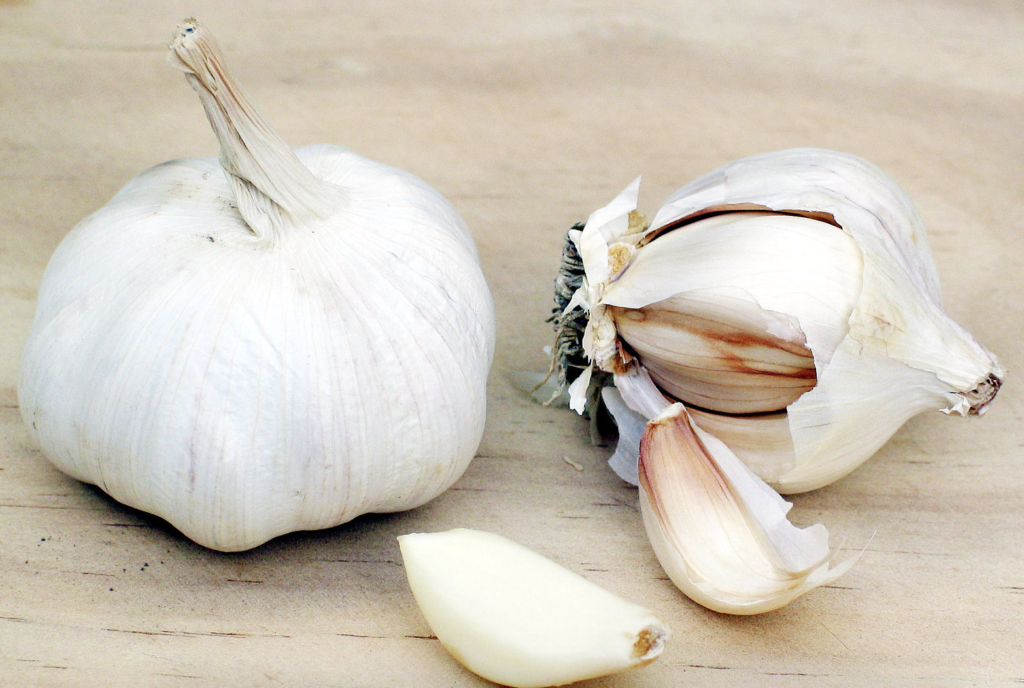Proponents of garlic claim it can help do everything from prevent cancer and lower blood pressure to strengthen bones and prevent heart attacks. While some studies suggest links between taking garlic and preventing and treating a host of disease and conditions, there are few widely accepted studies to support any one claim.

Understanding what some of the benefits of garlic might be will help you decide if you want to add more fresh garlic or a garlic supplement to your cooking, diet and healthy living goals.
Here are eight possible benefits of garlic (depending on how much and what type you take).
Lo-Cal Flavor Alternative
The flavor “trinity” used by food makers to sell products consists of sugar, fat and salt – all things we love in our snacks and meals. Garlic is a flavorful alternative for kicking up dishes, and it’s low in calories.
Lowers Blood Pressure
At higher doses, garlic can help the circulatory system and reduce blood pressure. Talk to a doctor about taking a garlic supplement if you have high blood pressure or hypertension (persistent high blood pressure).
Can Improves Blood Cholesterol
Garlic can help reduce two of the four cholesterol measures you get when you have a blood screen. While it doesn’t lower triglycerides or raise HDL (“good”) cholesterol, it can help lower total cholesterol and LDL (“bad”) cholesterol.
Good Source of Nutrients
Garlic is a good source of manganese, vitamin B and vitamin C, and contains other vitamins and minerals, including calcium selenium, phosphorus, iron and potassium.
Garlic Might Reduce Inflammation
More and more health problems are being traced to inflammation, including the effects of flu, hangovers and indigestion. Some of the nutrients in garlic boost the immune system and help reduce inflammation, helping you combat aches and pains that occur for a variety of reasons.
Garlic Aids Digestion
Recent research suggests that it’s inflammation, not acid, that causes “acid” reflux. It makes sense then that garlic, long thought to aid digestion, does so because of its anti-inflammatory effects. On the other hand, too much garlic can cause heartburn in some people, so be careful about how much you put in your dishes until you see how you react.
It Bugs Bugs
Garlic is known to help keep fleas and ticks off pets when put into a cat’s or dog’s food. The bugs taste the garlic in the pooch’s or kitty’s blood, don’t like it, and then tell the rest of their flea or tick family not to bother that pet. Eating garlic or rubbing it on your skin might help prevent mosquito bites (although your friends won’t want to sit next to you while you smell like a vampire hunter).
Garlic Fights Colds
Taking a garlic supplement can help boost the immune system and help prevent or reduce the effects of a cold. This is one of the more documented health benefits of garlic.
You Can Ward Off Vampires
Just kidding…Or am I?
How to Add More Garlic to Your Diet
•Roast it – spread roasted garlic on some crusty, olive oil-drizzled bread for an awesome garlic bread.
•Season with it – experiment with some of your favorite dishes by adding just a bit of freshly chopped garlic, then adding more until you find the right flavor profile.
•Add it – to salsa, guacamole, mashed potatoes, eggs, stews, roasts, pasta sauce, stir fry’s and other savory dishes.
•Pause – don’t chop garlic and then immediately heat it. Some of garlics’ healthiest nutrients remain separate in the cloves. When you cut and mash garlic, these nutrients mingle and form a health-giving compound. If you immediately heat garlic after cutting it, this doesn’t give the nutrients time start working together. You also don’t want to overcook garlic, especially by burning it by adding it to hot oil at the beginning of cooking a dish.
•Take a garlic supplement—talk to a registered dietitian to make sure you buy the right type of garlic supplement and avoid expensive pills that promise lots but offer little.